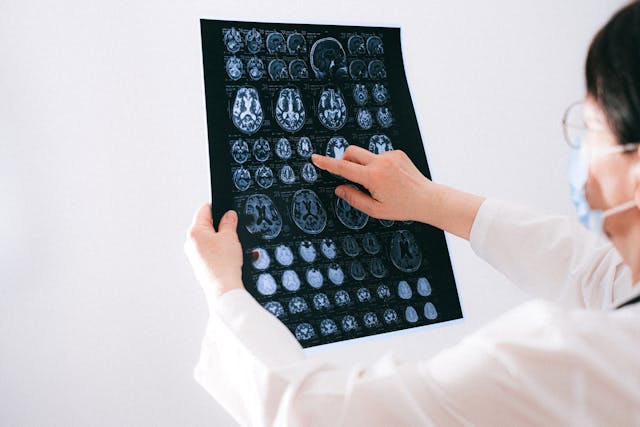
Online neurologist consultations
Book an online neurology appointment for migraines, dizziness, seizures, neuropathic pain, and more — with expert assessment and prescriptions when appropriate.
 Fast access to a neurology specialist
Fast access to a neurology specialist  Review of MRI, EEG, and other test results
Review of MRI, EEG, and other test results  Relief for headaches, vertigo, numbness, tremor
Relief for headaches, vertigo, numbness, tremor  Common treatments discussed: triptans, gabapentin, topiramate
Common treatments discussed: triptans, gabapentin, topiramate 
How to book an online neurology appointment
See a private neurologist online in three quick steps — secure video visit, expert diagnosis, and a treatment plan tailored to you.

Note: Seek emergency care if you experience symptoms like sudden severe headache, loss of consciousness, or stroke-like signs.
Online neurologist specialist near me
Find a neurologist close to you for video consultations on migraines, vertigo, seizures, and neuropathic pain — fast booking, expert care.
When to see a neurologist online
Neurological symptoms are often vague or overlap with other conditions. Consulting a neurologist online can help clarify your concerns, assess possible causes, and guide your next steps — whether it’s further testing, a treatment plan, or reassurance.
Headaches, migraines and vestibular symptoms
Migraines often stem from a combination of neurological sensitivity, hormonal shifts, genetic predisposition, and lifestyle factors like irregular sleep or diet. Vestibular symptoms — including vertigo, imbalance, and motion sensitivity — may be part of vestibular migraine, inner ear dysfunction, or brainstem-related disorders.
Neurologists distinguish these conditions through clinical history, symptom patterns, and associated features like nausea, photophobia, or tinnitus. Early classification helps define whether symptoms are episodic, chronic, or potentially secondary to another condition.
Numbness, tingling and nerve-related sensations
Tremors — rhythmic involuntary movements — vary widely in cause. Essential tremor is common and often familial, while Parkinsonian tremors are usually slower and appear at rest. Myoclonic jerks or fasciculations may point to motor neuron disease or systemic imbalances like electrolyte disturbances.
Motor symptoms often progress subtly and may mimic fatigue or deconditioning. Monitoring symmetry, progression, and relation to posture or activity helps identify conditions like multiple sclerosis, cervical myelopathy, or peripheral neuropathies.
Muscle weakness, tremors and coordination issues
Tremors — rhythmic involuntary movements — vary widely in cause. Essential tremor is common and often familial, while Parkinsonian tremors are usually slower and appear at rest. Myoclonic jerks or fasciculations may point to motor neuron disease or systemic imbalances like electrolyte disturbances.
Motor symptoms often progress subtly and may mimic fatigue or deconditioning. Monitoring symmetry, progression, and relation to posture or activity helps identify conditions like multiple sclerosis, cervical myelopathy, or peripheral neuropathies.
Sleep disturbances, brain fog and cognitive slowing
Fatigue and brain fog — often described as reduced clarity, memory lapses, or sluggish thinking — may stem from neuroinflammation, autonomic dysfunction, post-viral syndromes, or early neurodegenerative processes. Cognitive symptoms can also fluctuate with stress, hormonal changes, or sleep deprivation.
Evaluating whether these symptoms are primary or secondary is essential. Tools like sleep screening, memory testing, and neurological examination help differentiate psychiatric fatigue from early signs of conditions like mild cognitive impairment or chronic fatigue syndrome.
Stress, anxiety, life changes and neurological symptoms
Stress-related neurological symptoms often emerge during life transitions — such as moving, job change, or chronic caregiving — and may fluctuate without clear pathology. However, in some cases, stress can exacerbate latent neurological conditions or delay diagnosis by masking organic signs.
Understanding the boundary between functional symptoms and structural disorders is key. This includes assessing patterns over time, the presence of triggers, reversibility, and consistency across evaluations. Neurologists are uniquely positioned to parse this overlap and guide appropriate care without stigma.
Patients love


Your guide to healthcare in Spain
Practical information about the healthcare system, doctors and medical services in Spain.
Frequently asked questions about online neurology consultations
What patients usually ask before booking a video neurologist appointment.











